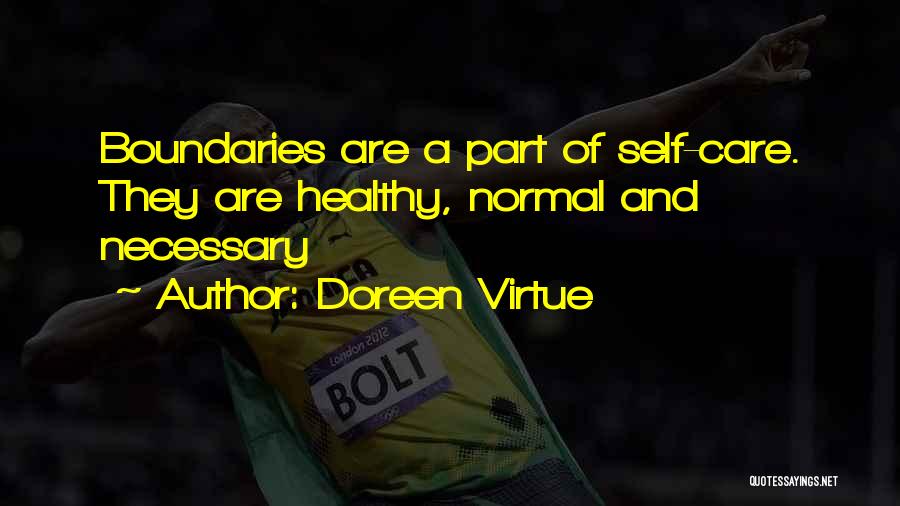Quotes & Sayings About Healthy Boundaries
Enjoy reading and share 37 famous quotes about Healthy Boundaries with everyone.
Top Healthy Boundaries Quotes
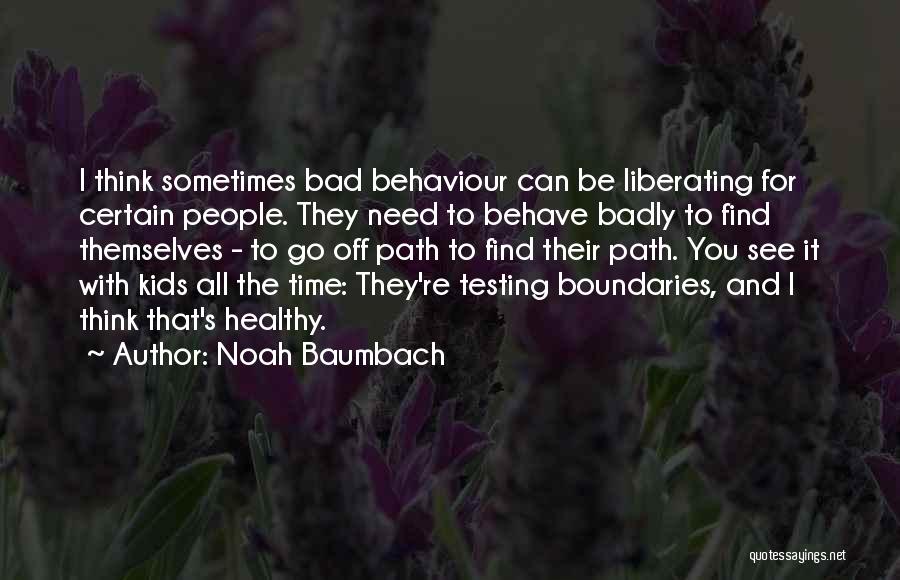
I think sometimes bad behaviour can be liberating for certain people. They need to behave badly to find themselves - to go off path to find their path. You see it with kids all the time: They're testing boundaries, and I think that's healthy. — Noah Baumbach
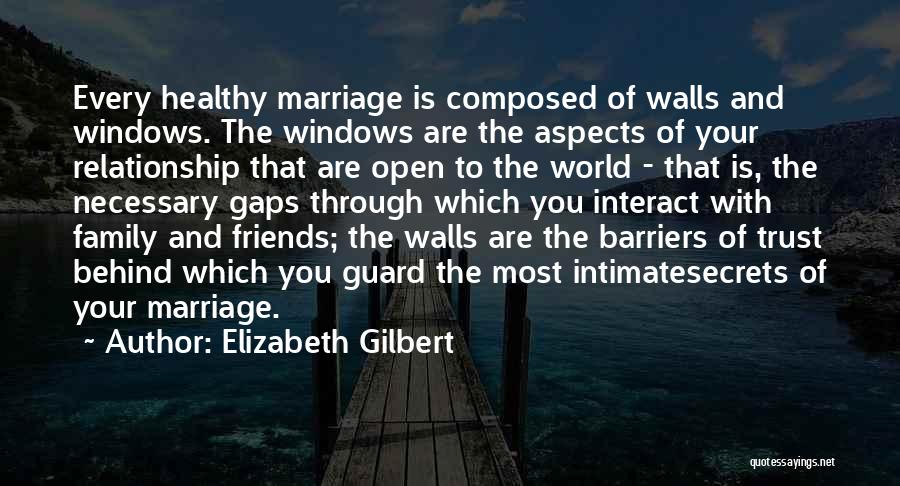
Every healthy marriage is composed of walls and windows. The windows are the aspects of your relationship that are open to the world - that is, the necessary gaps through which you interact with family and friends; the walls are the barriers of trust behind which you guard the most intimatesecrets of your marriage. — Elizabeth Gilbert
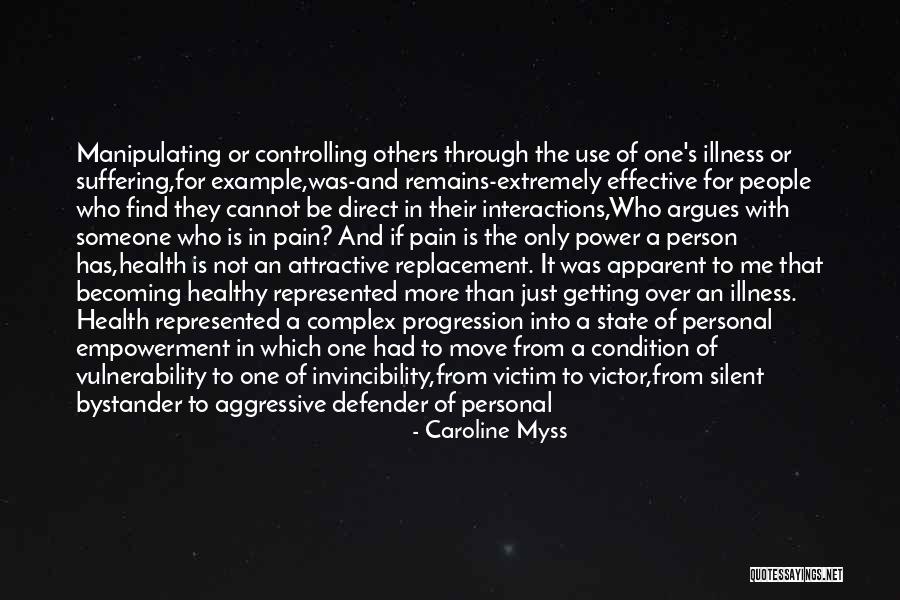
Manipulating or controlling others through the use of one's illness or suffering,for example,was-and remains-extremely effective for people who find they cannot be direct in their interactions,Who argues with someone who is in pain? And if pain is the only power a person has,health is not an attractive replacement. It was apparent to me that becoming healthy represented more than just getting over an illness. Health represented a complex progression into a state of personal empowerment in which one had to move from a condition of vulnerability to one of invincibility,from victim to victor,from silent bystander to aggressive defender of personal boundaries. Completing this race to the finish was a yeoman's task if ever there was one.Indeed,in opening the psyche and soul to the healing process,we had expanded the journey of wellness into one of personal transformation.
- — Caroline Myss
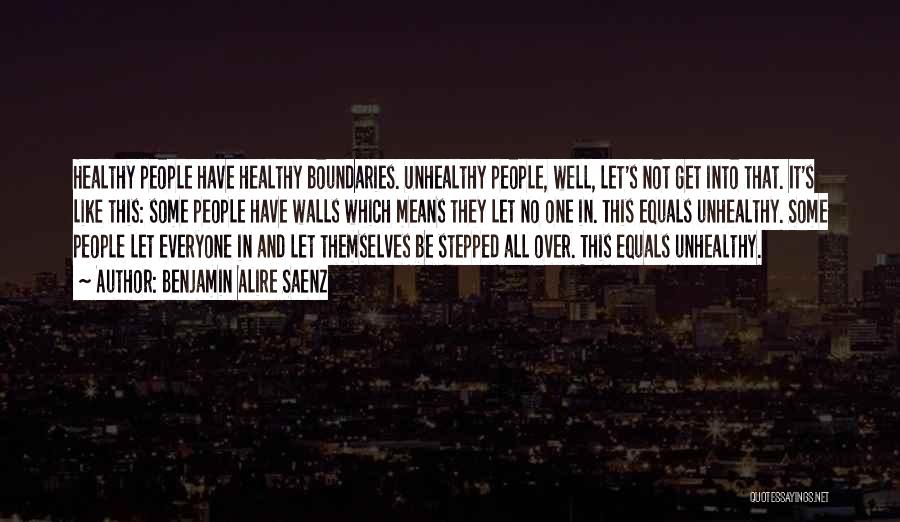
Healthy people have healthy boundaries. Unhealthy people, well, let's not get into that. It's like this: some people have walls which means they let no one in. This equals unhealthy. Some people let everyone in and let themselves be stepped all over. This equals unhealthy. — Benjamin Alire Saenz

Boundaries and risk management are very important parts of living a healthy and positive life. — Bryant McGill
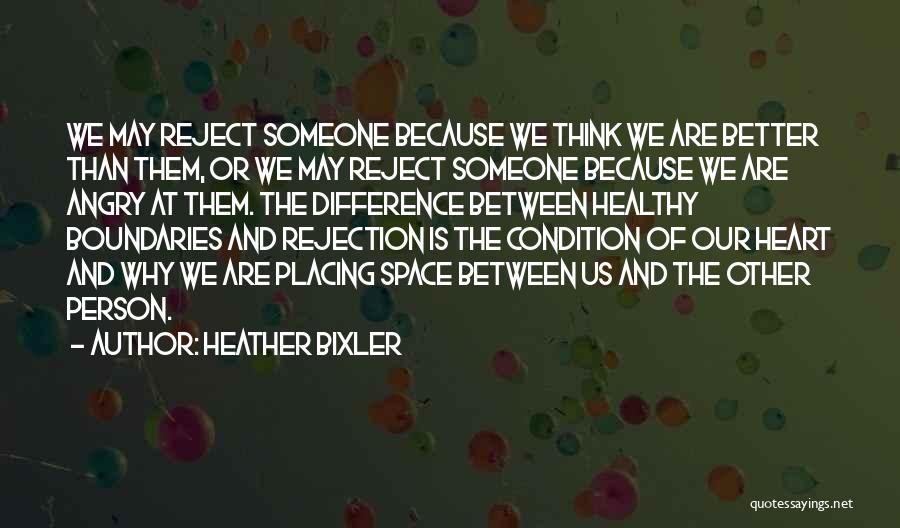
We may reject someone because we think we are better than them, or we may reject someone because we are angry at them. The difference between healthy boundaries and rejection is the condition of our heart and why we are placing space between us and the other person. — Heather Bixler
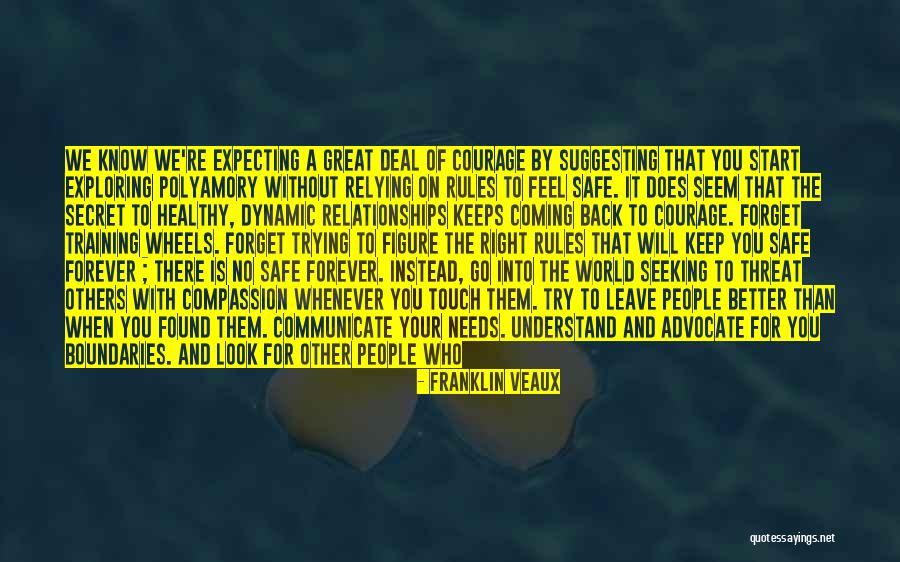
We know we're expecting a great deal of courage by suggesting that you start exploring polyamory without relying on rules to feel safe. It does seem that the secret to healthy, dynamic relationships keeps coming back to courage. Forget training wheels. Forget trying to figure the right rules that will keep you safe forever ; there is no safe forever. Instead, go into the world seeking to threat others with compassion whenever you touch them. Try to leave people better than when you found them. Communicate your needs. Understand and advocate for you boundaries. And look for other people who will do the same. Trust them when they say they love you; where communication and compassion exist, you don't need rules to keep you safe. We don't learn how to be compassionate by disenfranchising other people; we learn how to be compassionate by practicing compassion. — Franklin Veaux
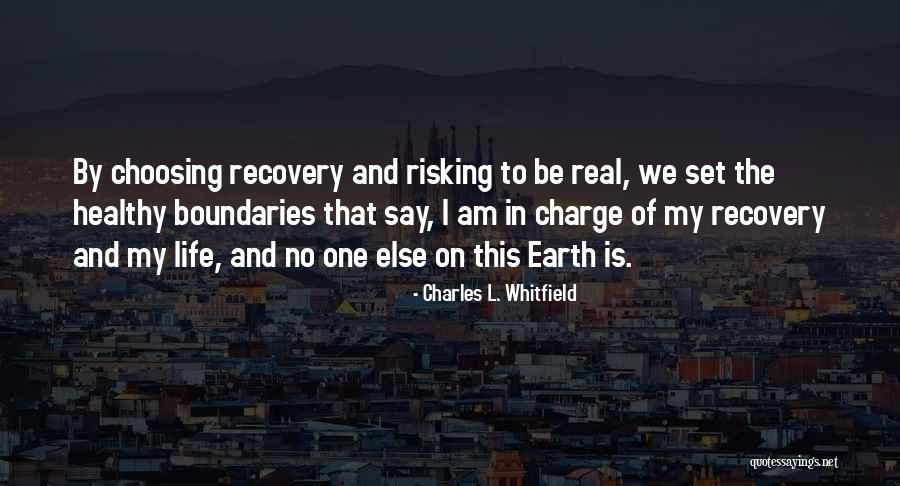
By choosing recovery and risking to be real, we set the healthy boundaries that say, I am in charge of my recovery and my life, and no one else on this Earth is. — Charles L. Whitfield
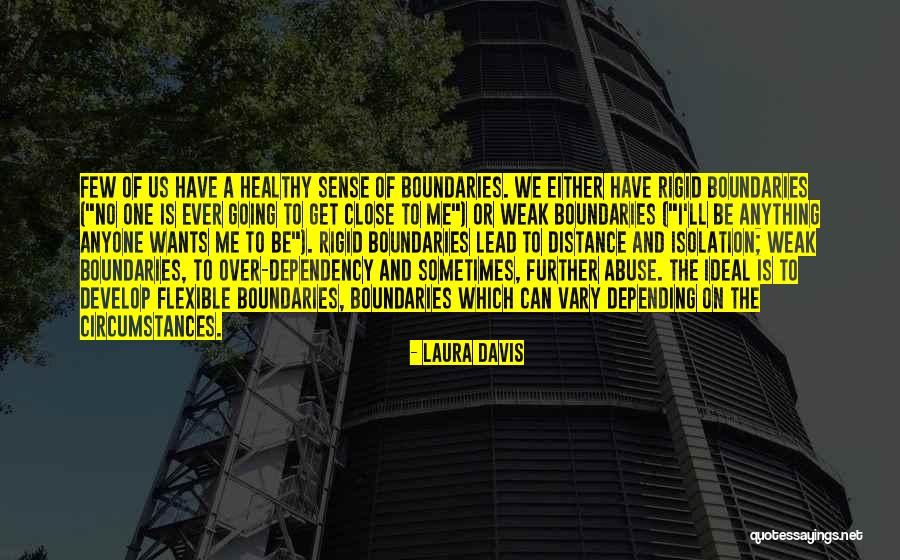
Few of us have a healthy sense of boundaries. We either have rigid boundaries ("No one is ever going to get close to me") or weak boundaries ("I'll be anything anyone wants me to be"). Rigid boundaries lead to distance and isolation; weak boundaries, to over-dependency and sometimes, further abuse. The ideal is to develop flexible boundaries, boundaries which can vary depending on the circumstances. — Laura Davis
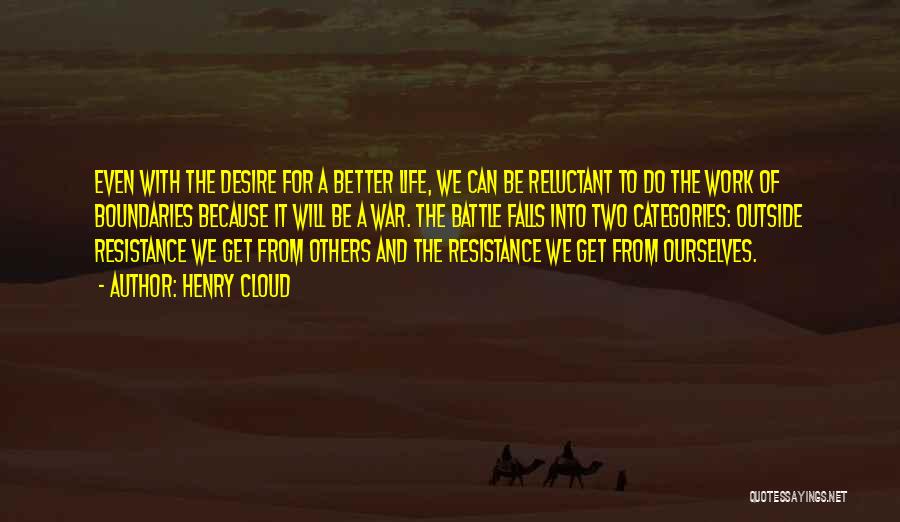
Even with the desire for a better life, we can be reluctant to do the work of boundaries because it will be a war. The battle falls into two categories: outside resistance we get from others and the resistance we get from ourselves. — Henry Cloud
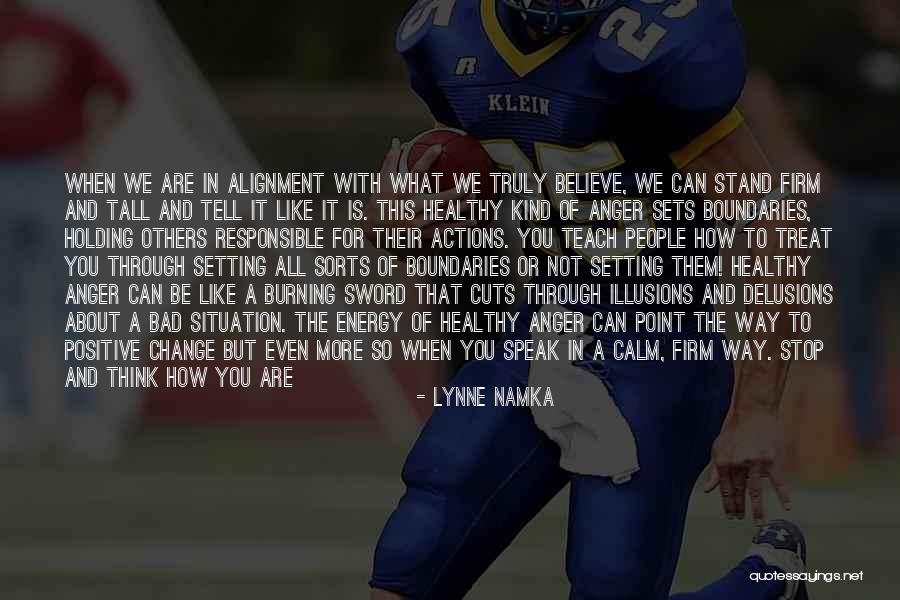
When we are in alignment with what we truly believe, we can stand firm and tall and tell it like it is. This healthy kind of anger sets boundaries, holding others responsible for their actions. You teach people how to treat you through setting all sorts of boundaries or not setting them! Healthy anger can be like a burning sword that cuts through illusions and delusions about a bad situation. The energy of healthy anger can point the way to positive change but even more so when you speak in a calm, firm way. Stop and think how you are training people to treat you. The secret of boundary setting is centering yourself, breathing deeply and connecting with your truth to align yourself with higher principles, letting them speak through you.
- The Quick Anger Makeover and Other Cutting-Edge Techniques to Release Anger! — Lynne Namka
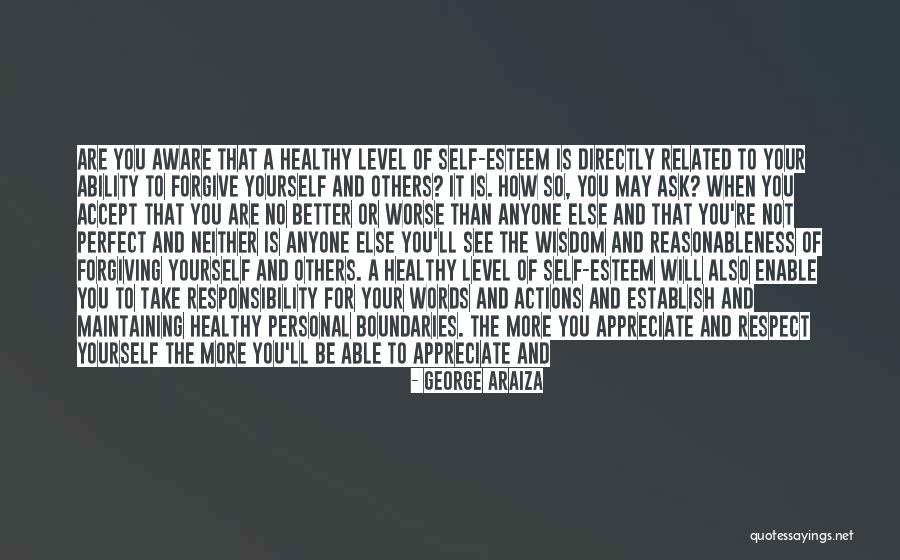
Are you aware that a healthy level of self-esteem is directly related to your ability to forgive yourself and others? It is. How so, you may ask? When you accept that you are no better or worse than anyone else and that you're not perfect and neither is anyone else you'll see the wisdom and reasonableness of forgiving yourself and others. A healthy level of self-esteem will also enable you to take responsibility for your words and actions and establish and maintaining healthy personal boundaries. The more you appreciate and respect yourself the more you'll be able to appreciate and respect others and others will find it easy to appreciate and respect you. — George Araiza
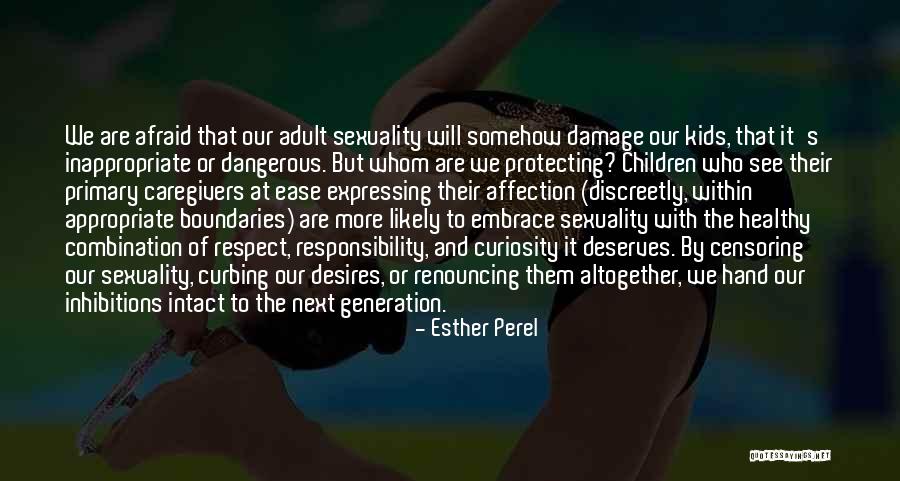
We are afraid that our adult sexuality will somehow damage our kids, that it's inappropriate or dangerous. But whom are we protecting? Children who see their primary caregivers at ease expressing their affection (discreetly, within appropriate boundaries) are more likely to embrace sexuality with the healthy combination of respect, responsibility, and curiosity it deserves. By censoring our sexuality, curbing our desires, or renouncing them altogether, we hand our inhibitions intact to the next generation. — Esther Perel
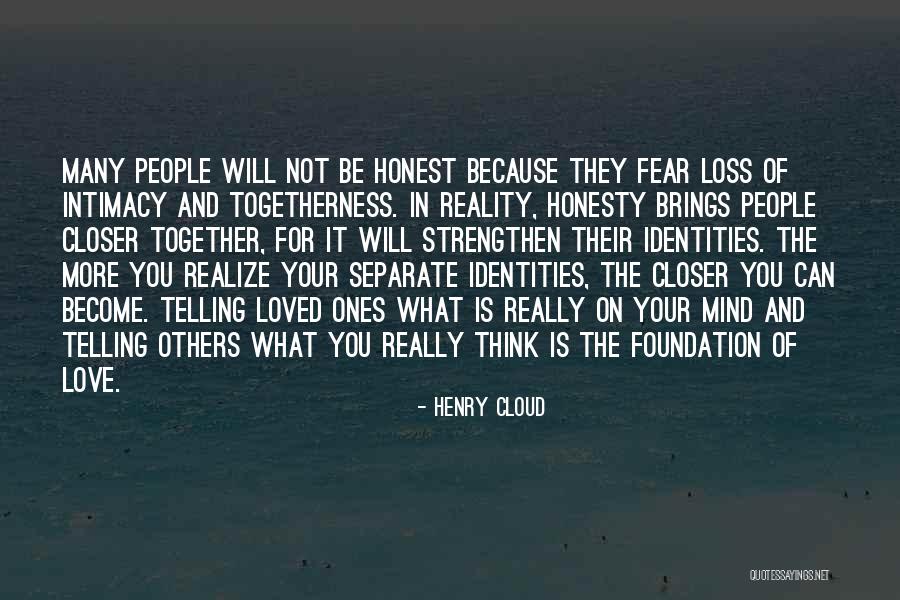
Many people will not be honest because they fear loss of intimacy and togetherness. In reality, honesty brings people closer together, for it will strengthen their identities. The more you realize your separate identities, the closer you can become. Telling loved ones what is really on your mind and telling others what you really think is the foundation of love. — Henry Cloud
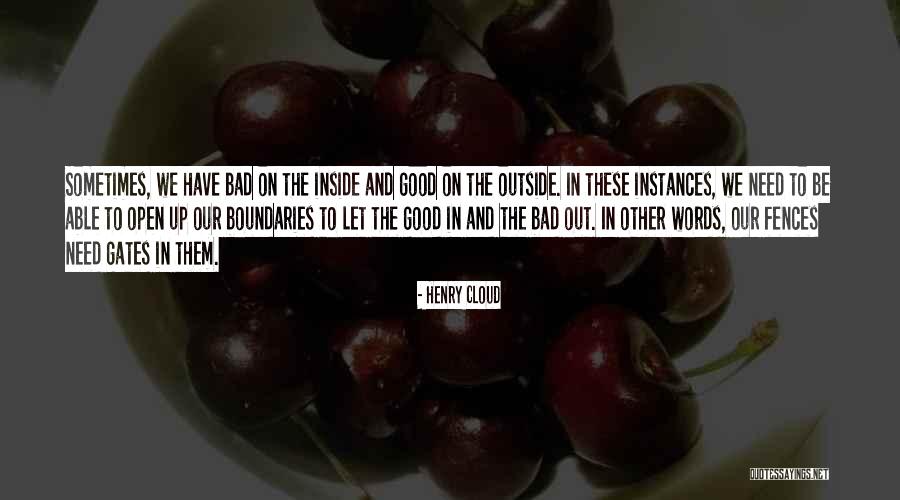
Sometimes, we have bad on the inside and good on the outside. In these instances, we need to be able to open up our boundaries to let the good in and the bad out. In other words, our fences need gates in them. — Henry Cloud
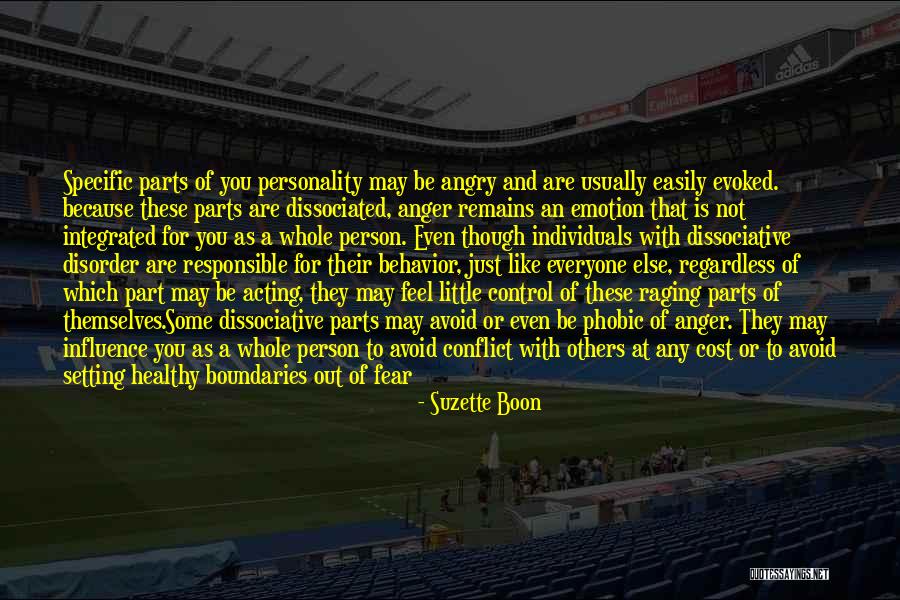
Specific parts of you personality may be angry and are usually easily evoked. because these parts are dissociated, anger remains an emotion that is not integrated for you as a whole person. Even though individuals with dissociative disorder are responsible for their behavior, just like everyone else, regardless of which part may be acting, they may feel little control of these raging parts of themselves.
Some dissociative parts may avoid or even be phobic of anger. They may influence you as a whole person to avoid conflict with others at any cost or to avoid setting healthy boundaries out of fear of someone else's anger; or they may urge you to withdraw from others almost completely. — Suzette Boon
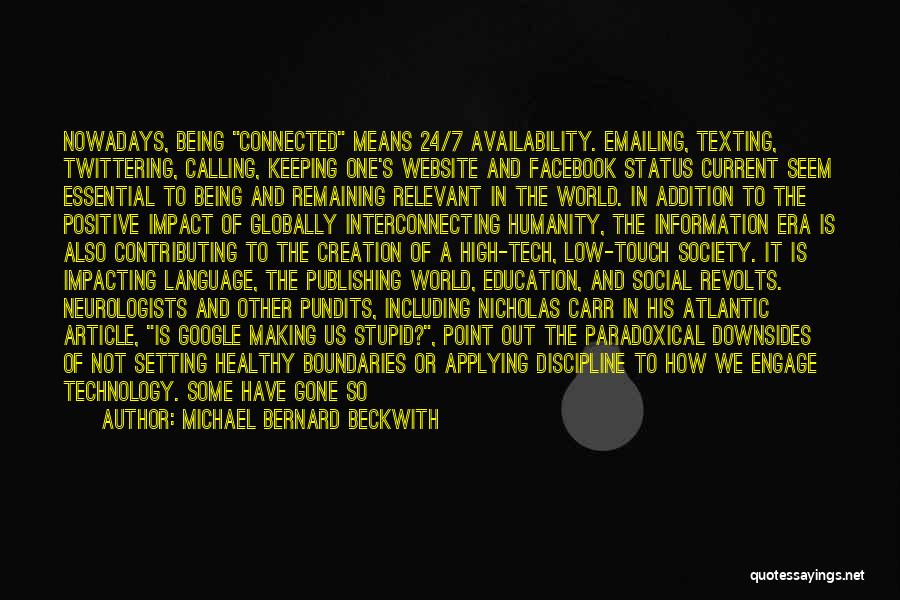
Nowadays, being "connected" means 24/7 availability. Emailing, texting, Twittering, calling, keeping one's website and Facebook status current seem essential to being and remaining relevant in the world. In addition to the positive impact of globally interconnecting humanity, the information era is also contributing to the creation of a high-tech, low-touch society. It is impacting language, the publishing world, education, and social revolts. Neurologists and other pundits, including Nicholas Carr in his Atlantic article, "Is Google Making Us Stupid?", point out the paradoxical downsides of not setting healthy boundaries or applying discipline to how we engage technology. Some have gone so far as to suggest that it is making us "spiritually stupid" by keeping us too distracted to participate in spiritual practices. But how about this: can using technology with mindfulness lead to beneficial social and spiritual connection? — Michael Bernard Beckwith
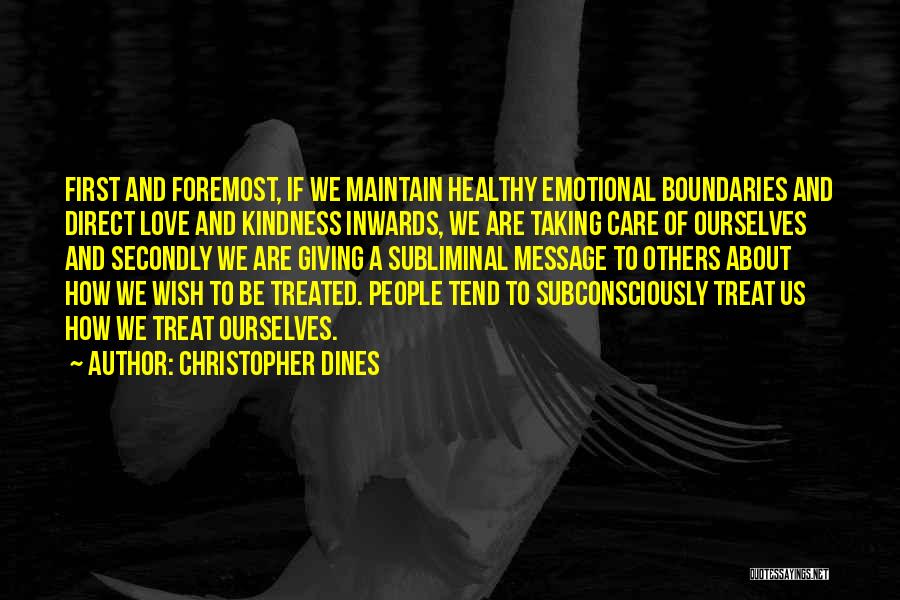
First and foremost, if we maintain healthy emotional boundaries and direct love and kindness inwards, we are taking care of ourselves and secondly we are giving a subliminal message to others about how we wish to be treated. People tend to subconsciously treat us how we treat ourselves. — Christopher Dines
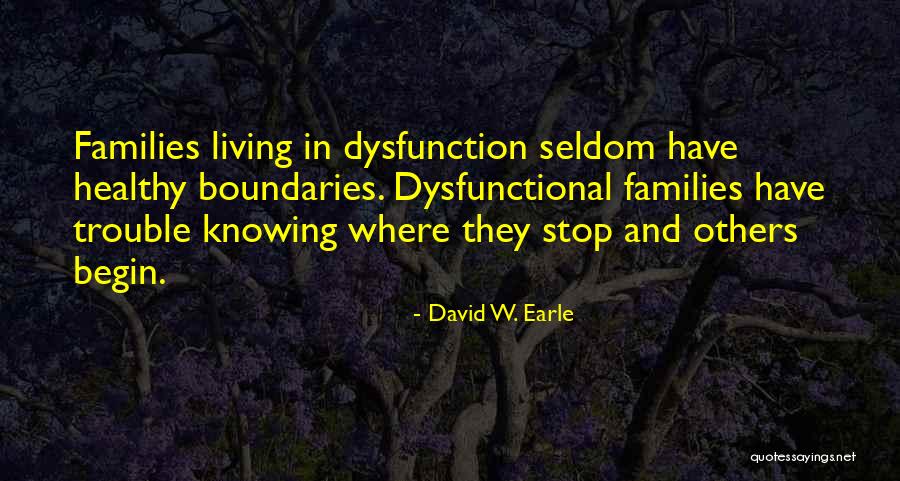
Families living in dysfunction seldom have healthy boundaries. Dysfunctional families have trouble knowing where they stop and others begin. — David W. Earle
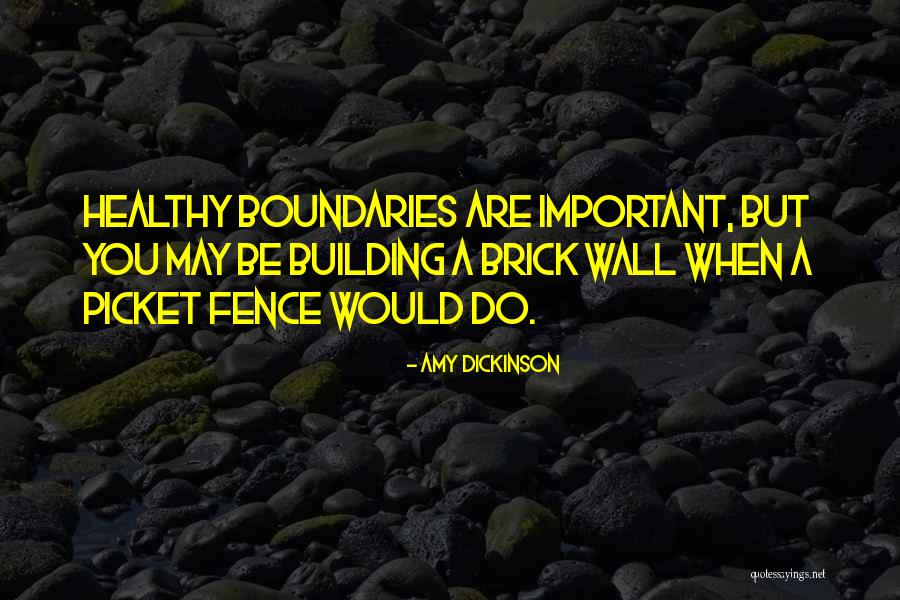
Healthy boundaries are important, but you may be building a brick wall when a picket fence would do. — Amy Dickinson
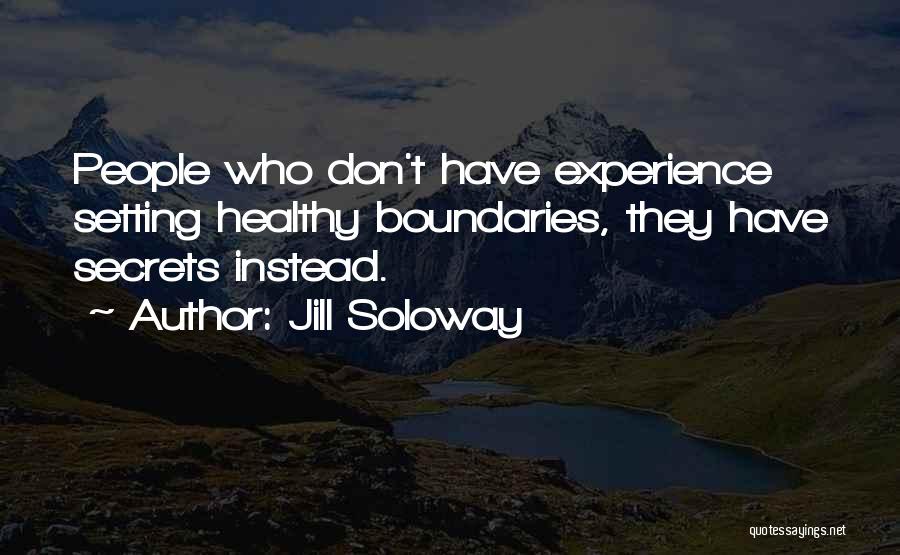
People who don't have experience setting healthy boundaries, they have secrets instead. — Jill Soloway
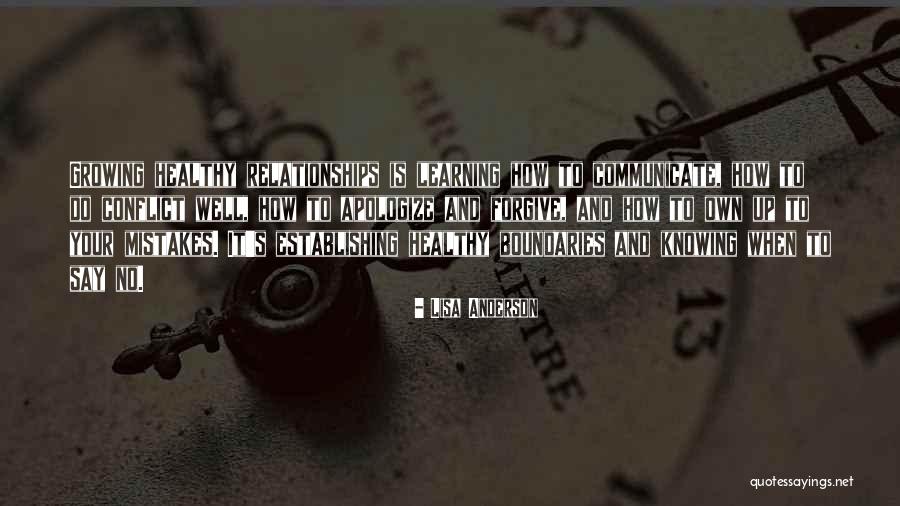
Growing healthy relationships is learning how to communicate, how to do conflict well, how to apologize and forgive, and how to own up to your mistakes. It's establishing healthy boundaries and knowing when to say no. — Lisa Anderson
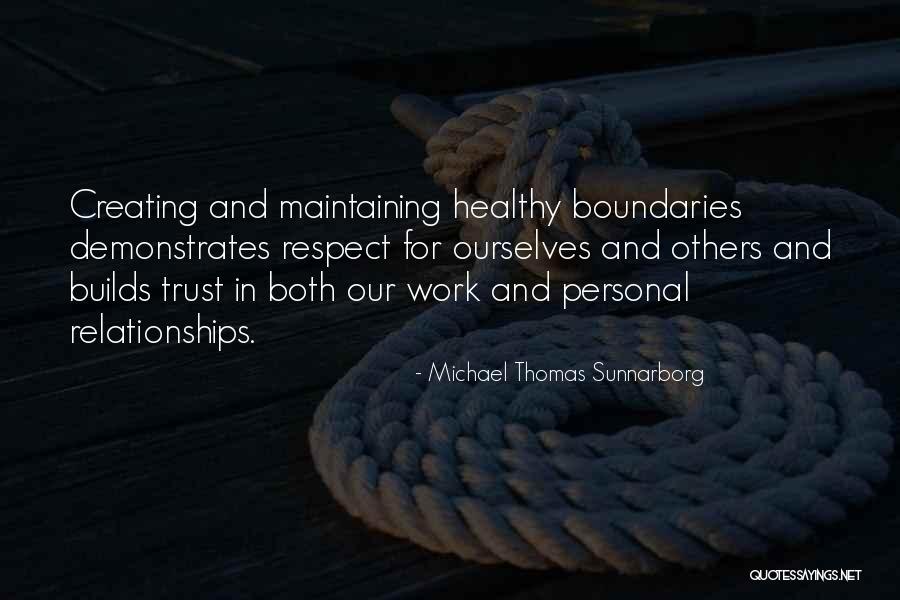
Creating and maintaining healthy boundaries demonstrates respect for ourselves and others and builds trust in both our work and personal relationships. — Michael Thomas Sunnarborg
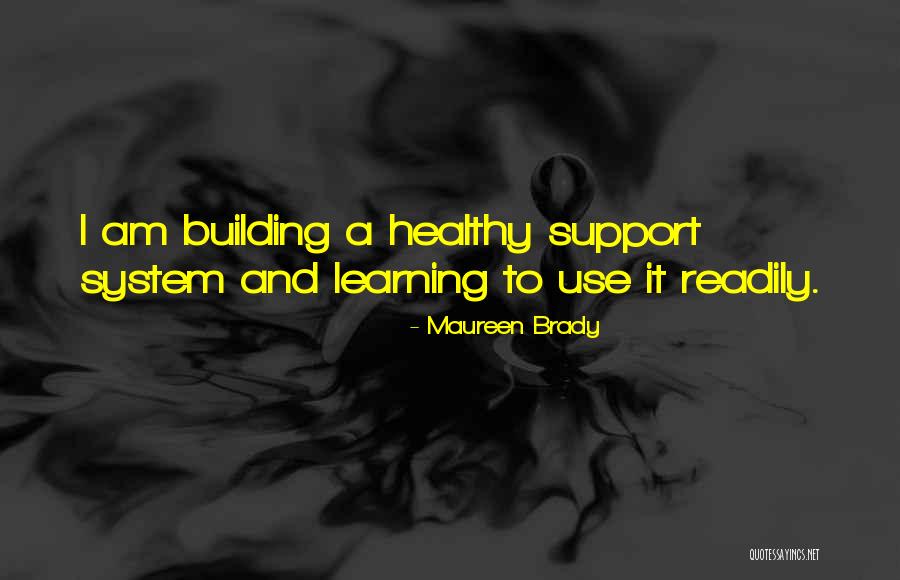
I am building a healthy support system and learning to use it readily. — Maureen Brady
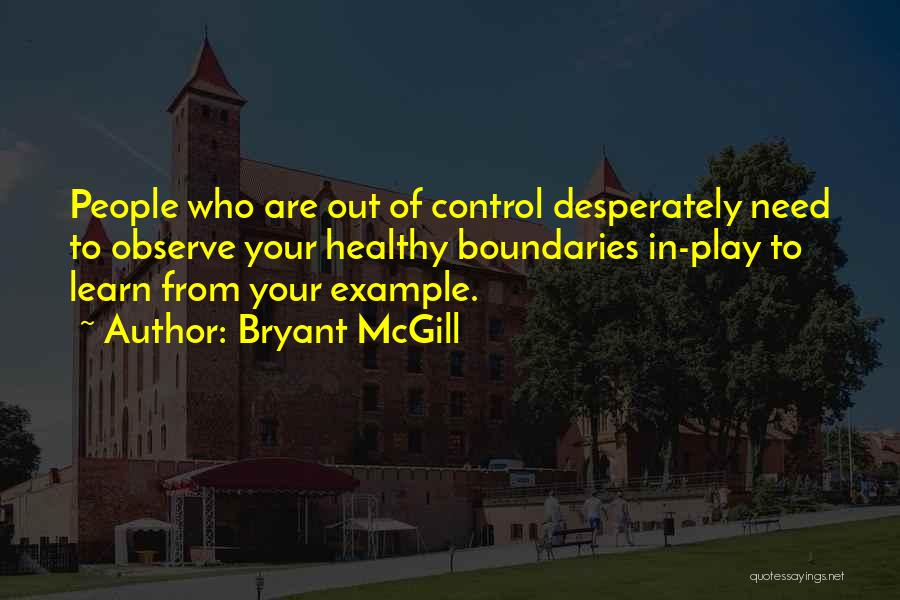
People who are out of control desperately need to observe your healthy boundaries in-play to learn from your example. — Bryant McGill
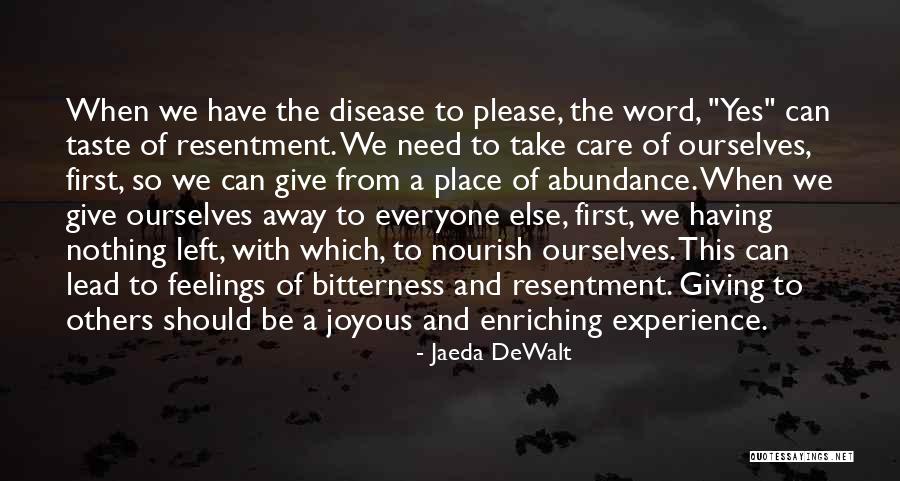
When we have the disease to please, the word, "Yes" can taste of resentment. We need to take care of ourselves, first, so we can give from a place of abundance. When we give ourselves away to everyone else, first, we having nothing left, with which, to nourish ourselves. This can lead to feelings of bitterness and resentment. Giving to others should be a joyous and enriching experience. — Jaeda DeWalt
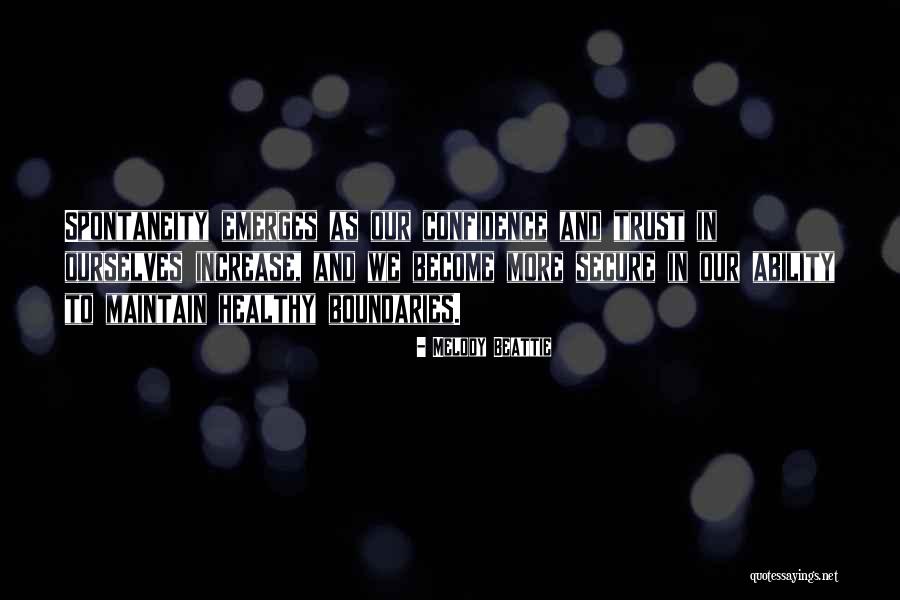
Spontaneity emerges as our confidence and trust in ourselves increase, and we become more secure in our ability to maintain healthy boundaries. — Melody Beattie
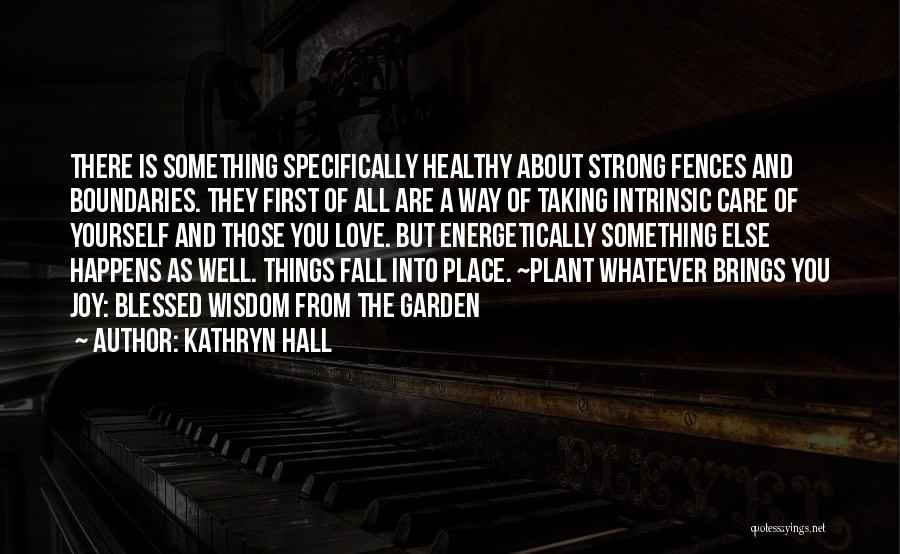
There is something specifically healthy about strong fences and boundaries. They first of all are a way of taking intrinsic care of yourself and those you love. But energetically something else happens as well. Things fall into place. ~Plant Whatever Brings You Joy: Blessed Wisdom from the Garden — Kathryn Hall
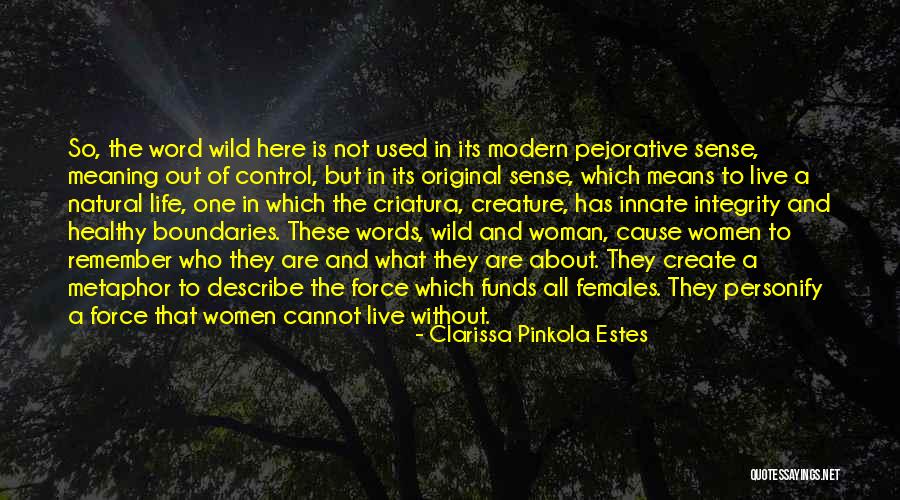
So, the word wild here is not used in its modern pejorative sense, meaning out of control, but in its original sense, which means to live a natural life, one in which the criatura, creature, has innate integrity and healthy boundaries. These words, wild and woman, cause women to remember who they are and what they are about. They create a metaphor to describe the force which funds all females. They personify a force that women cannot live without. — Clarissa Pinkola Estes
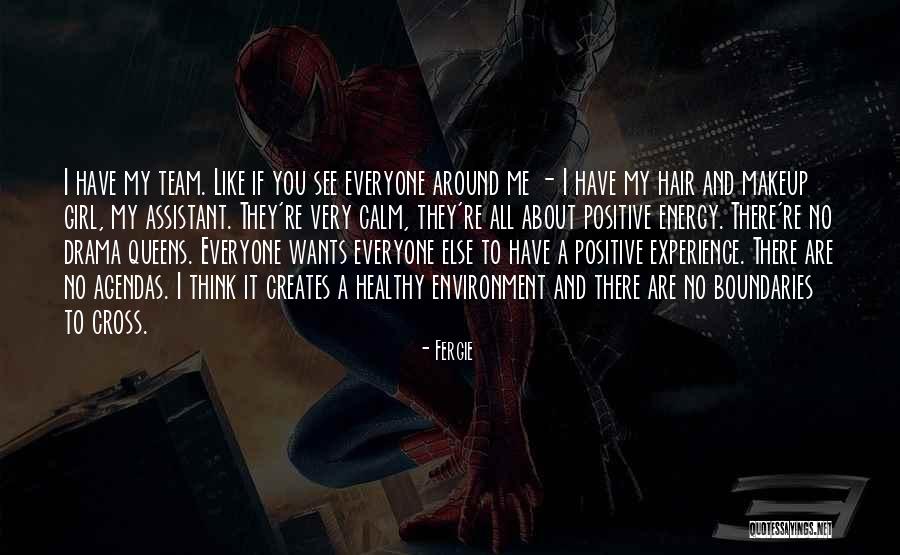
I have my team. Like if you see everyone around me - I have my hair and makeup girl, my assistant. They're very calm, they're all about positive energy. There're no drama queens. Everyone wants everyone else to have a positive experience. There are no agendas. I think it creates a healthy environment and there are no boundaries to cross. — Fergie
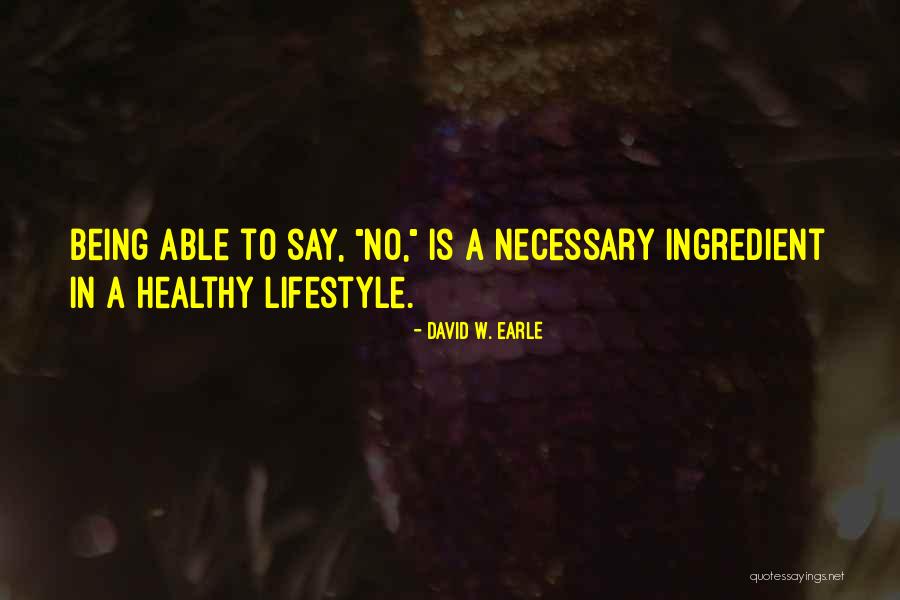
Being able to say, "No," is a necessary ingredient in a healthy lifestyle. — David W. Earle
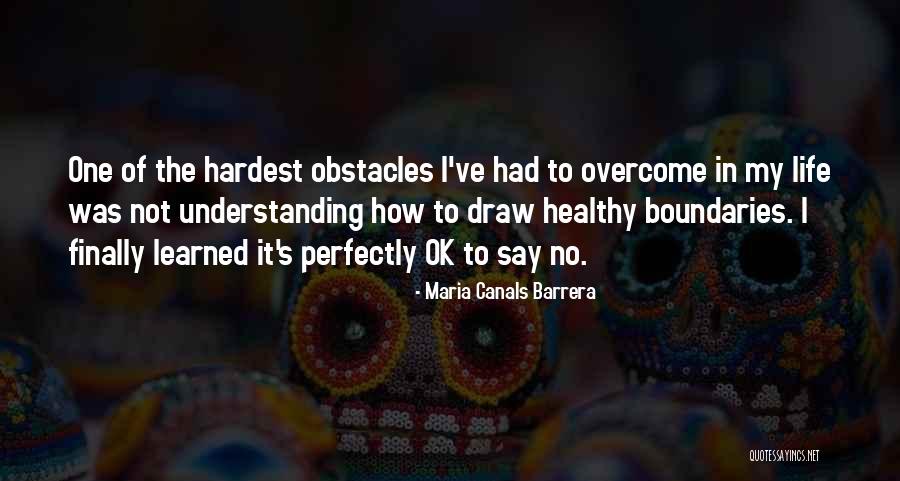
One of the hardest obstacles I've had to overcome in my life was not understanding how to draw healthy boundaries. I finally learned it's perfectly OK to say no. — Maria Canals Barrera
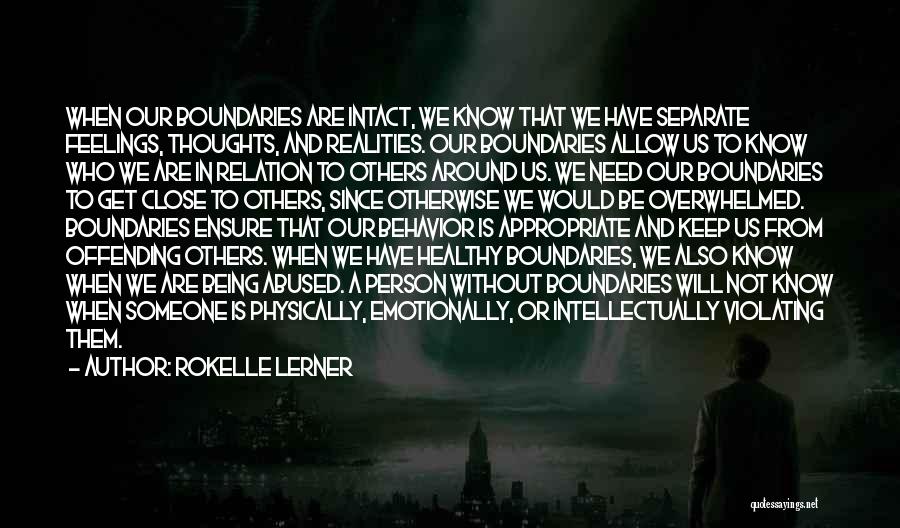
When our boundaries are intact, we know that we have separate feelings, thoughts, and realities. Our boundaries allow us to know who we are in relation to others around us. We need our boundaries to get close to others, since otherwise we would be overwhelmed. Boundaries ensure that our behavior is appropriate and keep us from offending others. When we have healthy boundaries, we also know when we are being abused. A person without boundaries will not know when someone is physically, emotionally, or intellectually violating them. — Rokelle Lerner
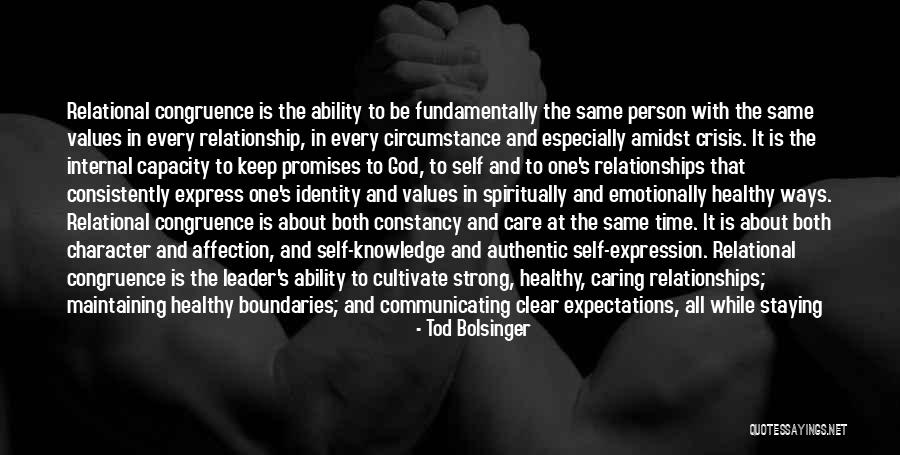
Relational congruence is the ability to be fundamentally the same person with the same values in every relationship, in every circumstance and especially amidst crisis. It is the internal capacity to keep promises to God, to self and to one's relationships that consistently express one's identity and values in spiritually and emotionally healthy ways. Relational congruence is about both constancy and care at the same time. It is about both character and affection, and self-knowledge and authentic self-expression. Relational congruence is the leader's ability to cultivate strong, healthy, caring relationships; maintaining healthy boundaries; and communicating clear expectations, all while staying focused on the mission. — Tod Bolsinger
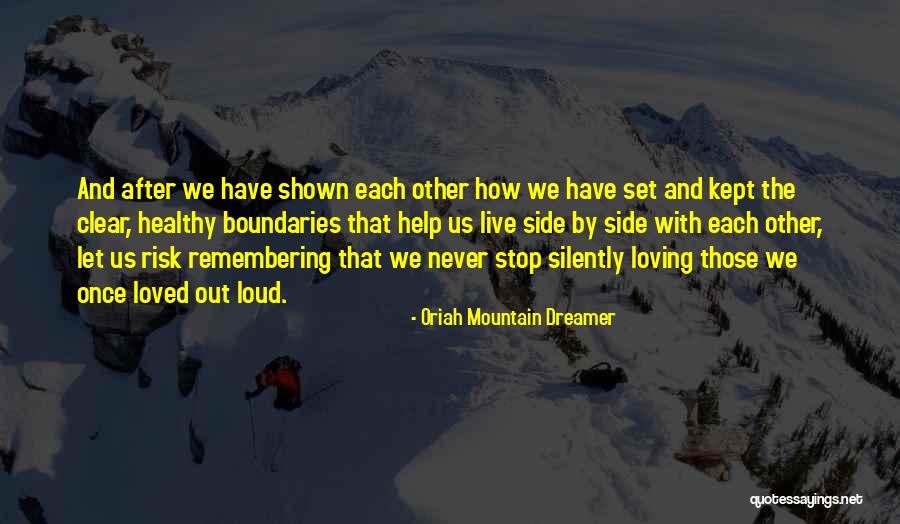
And after we have shown each other how we have set and kept the clear, healthy boundaries that help us live side by side with each other, let us risk remembering that we never stop silently loving those we once loved out loud. — Oriah Mountain Dreamer







